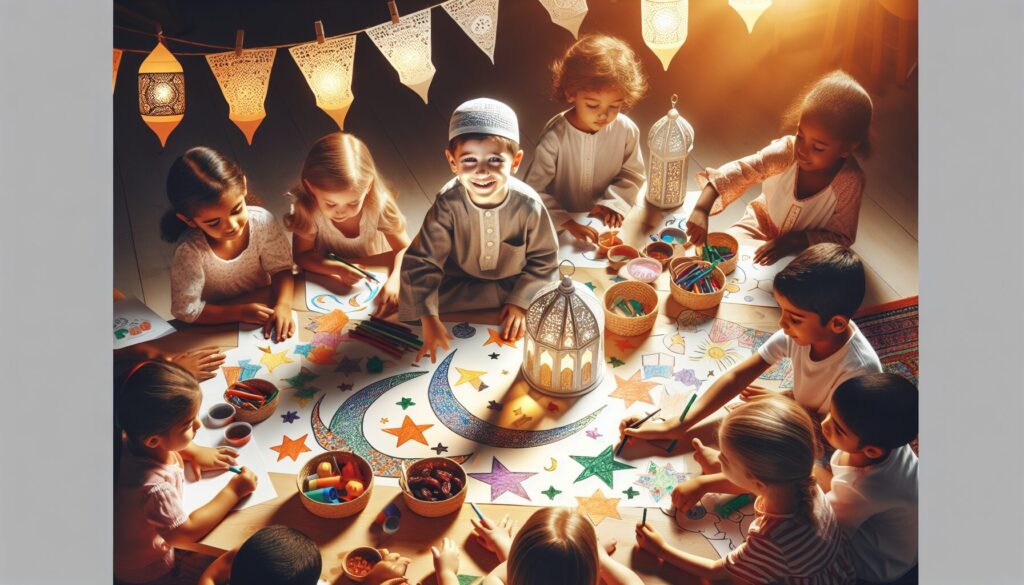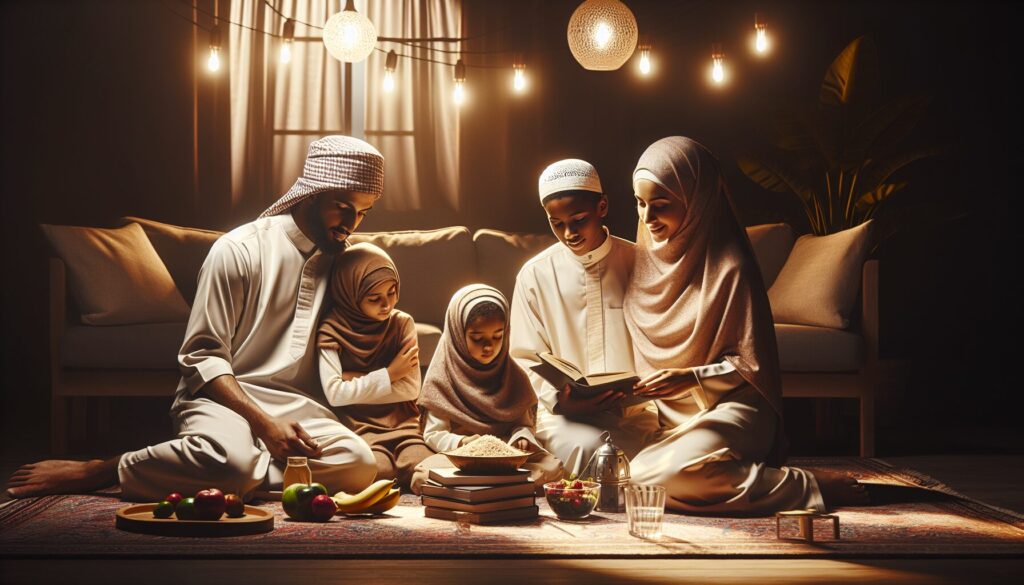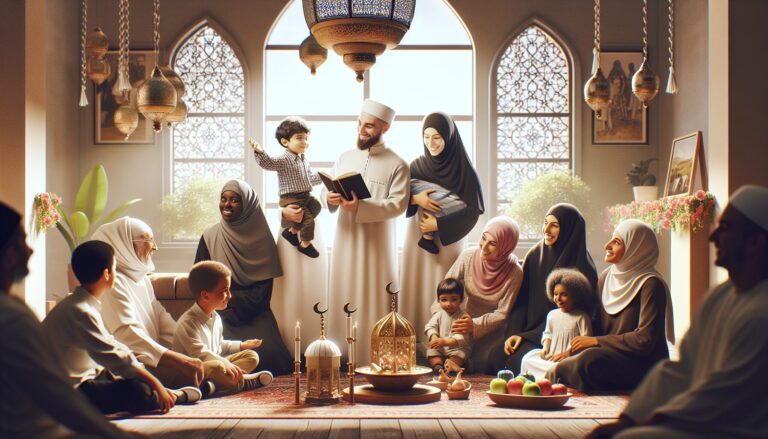Last year, while visiting friends in Auckland during Ramadan, their seven-year-old daughter surprised everyone during iftar by announcing she wanted to fast “just like Mummy and Baba” – and honestly, that moment made me realise how crucial teaching kids about Ramadan fasting really is before they’re ready to participate! For families living in New Zealand, where little ones are often the only Muslims in their class, it’s become even more important to help them understand and feel connected to this beautiful pillar of Islam. Whether you’re navigating those endless “but why can’t I eat too?” questions from your preschooler or supporting your tween through their first proper fast during those long December days (yes, Southern Hemisphere Ramadan hits different!), finding age-appropriate ways to involve your tamariki in this blessed month can transform it from something they watch adults do into something they genuinely understand and cherish.
Fun Ramadan Activities for Preschoolers and Toddlers

Getting your little ones involved during the holy month doesn’t have to be complicated! I’ve discovered that preschoolers and toddlers absolutely love hands-on activities that make them feel like they’re part of the special traditions. When you’re teaching kids about Ramadan fasting at this young age, it’s all about creating joyful experiences rather than focusing on the actual fasting itself.
One of my favorite activities is creating a moon and star sensory bin. Fill a plastic container with rice or dried chickpeas (both easily found at your local Pak’nSave or Countdown), then hide small crescent moons and stars cut from cardboard inside. Little hands love digging through to find these treasures! You can even add some dates or wrapped lollies as special surprises. My three-year-old nephew spent nearly an hour playing with his last year, and it kept him engaged while the adults prepared iftar.
Crafting paper lanterns has become a beloved tradition in our household. Here’s what makes this activity perfect for tiny hands:
- Use construction paper from Warehouse Stationery to create simple folded designs
- Let toddlers decorate with stickers instead of trying to cut intricate patterns
- Hang them around your lounge or in bedroom windows
- Add battery-operated tea lights for a magical glow during evening gatherings
Furthermore, storytelling works brilliantly with this age group. Create a special “story corner” with cushions and blankets where you share age-appropriate tales about kindness, sharing, and helping others. The Auckland Libraries system has wonderful picture books that align with these themes, even if they’re not specifically about the holy month.
Interactive Learning Through Play
Setting up a pretend iftar party with their stuffed animals and dolls helps preschoolers understand the concept of breaking fast together. Give them plastic plates and play food, letting them “serve” their toys at sunset. This role-playing activity naturally teaches patience and the importance of family meals.
Additionally, creating a kindness calendar works wonderfully for four and five-year-olds. Draw thirty boxes on a large poster board and let your child place a sticker each time they do something kind. Simple acts like sharing toys with siblings, helping set the table, or giving someone a hug all count. My daughter loved watching her sticker collection grow throughout the month!
Music and movement shouldn’t be overlooked either. Teaching simple nasheeds with hand movements keeps toddlers engaged while introducing spiritual concepts. Even something as basic as clapping along to rhythmic counting in Arabic helps build those early connections.
However, remember that attention spans are short at this age. Rotate activities every 10-15 minutes and don’t worry if your toddler wanders off to play with their blocks instead. The goal is creating positive associations, not perfect participation. These gentle introductions lay the foundation for deeper understanding as they grow older in our beautiful Kiwi Muslim community.
Engaging Elementary School Children with Fasting Traditions
Elementary school children possess an incredible capacity for understanding complex spiritual concepts when you present them through hands-on activities and relatable experiences. Between ages 6 and 11, they’re developing their sense of identity and belonging, making this the perfect window for deepening their connection to fasting traditions.
Creating meaningful connections through storytelling remains one of the most powerful tools for this age group. You’ll find that weaving tales about Prophet Muhammad’s (PBUH) companions who were children during his time captivates their imagination. Share stories about Abdullah ibn Abbas, who was just a young boy when he learned about fasting, or discuss how children in different countries celebrate today. These narratives help them see themselves as part of a larger, timeless tradition.
Interactive fasting charts work brilliantly for visual learners at this stage. Design a colorful calendar where they can track partial fasting attempts – perhaps skipping morning tea at school or waiting until noon for their first snack on weekends. Let them decorate it with stickers from Whitcoulls or create their own achievement badges. This visual progress helps them feel accomplished while building gradually toward longer fasting periods.
Hands-On Activities That Build Understanding
Role-playing activities transform abstract concepts into concrete experiences. Set up a “charity station” in your home where children can sort non-perishable foods for donation. They might organize items you’ve purchased specifically for the Auckland City Mission or local mosque’s food drive. Through this process, they physically experience the connection between fasting and helping others.
Cooking together provides another avenue for engagement. Elementary schoolers can help prepare simple iftar items like fruit salads, date balls rolled in coconut, or homemade lemonade with mint from your garden. Furthermore, they’re old enough to understand meal planning – let them help create shopping lists and learn about nutritious suhoor options that provide lasting energy.
Consider establishing a “fasting buddy” system with their cousins or friends from weekend Islamic classes. They can share their experiences through video calls, comparing how they’re managing their partial fasts. This peer support makes the journey feel less isolating, especially when their schoolmates at regular Kiwi schools might not understand why they’re not eating during lunch.
Additionally, craft projects reinforce learning through creativity. Children this age love making paper lanterns, designing their own prayer mats with fabric markers, or creating gratitude journals where they write three things they’re thankful for each day. These tangible creations become cherished keepsakes that remind them of their growing spiritual journey.
Teaching kids about Ramadan fasting at this age also involves honest conversations about challenges. Acknowledge that feeling hungry is difficult, and it’s okay to start small. Perhaps they fast only on weekends initially, or choose one day during the school holidays. Celebrate these achievements genuinely – their effort matters more than perfection.
Remember to incorporate technology appropriately. Educational apps like Muslim Kids TV offer age-appropriate content that reinforces concepts you’re teaching at home. However, balance screen time with real-world experiences like visiting different mosques around Auckland to see how various communities break their fasts together.
Helping Tweens Participate in Ramadan Meaningfully

Tweens occupy a unique space between childhood and adolescence, making their participation in Ramadan both exciting and challenging. At this age, they’re developing their own spiritual identity while still needing guidance. You’ll find that ages 10-12 bring newfound enthusiasm for religious practices, but they also need structured support to make their experience meaningful.
Start by involving your tween in pre-Ramadan preparations. Let them help create the family’s iftar menu for the week, research charity organizations in Wellington or Christchurch where you might donate, or design a Ramadan calendar for younger siblings. This ownership makes them feel valued and connected to the month’s significance. Additionally, encourage them to set personal spiritual goals – perhaps memorizing specific suras or completing a certain number of voluntary prayers.
Gradual fasting remains the safest approach for this age group. Many tweens in New Zealand successfully fast during weekends and school holidays first. Consider the longer summer days if Ramadan falls during December or January – you might adjust their fasting schedule accordingly. Some families find success with the “training wheels” method: fasting from Fajr until Dhuhr initially, then extending to Asr, before attempting full days.
Creating Meaningful Connections
Transform teaching kids about Ramadan fasting into an interactive journey by connecting religious practices with their daily interests. If your tween loves sports, discuss how Muslim athletes like Sonny Bill Williams manage their training during Ramadan. For those interested in social justice, explore how fasting builds empathy for communities facing food insecurity across Aotearoa.
Furthermore, tweens thrive on peer connections. Organize iftar gatherings with other Muslim families where tweens can share their fasting experiences. Many mosques run youth programs specifically designed for this age group. The Federation of Islamic Associations of New Zealand often coordinates youth activities that make religious observance feel less isolating and more communal.
Technology can become your ally here. There are excellent apps that track fasting progress, send reminder notifications for prayer times adjusted to New Zealand’s time zones, and offer age-appropriate Islamic content. However, balance screen time with hands-on activities like preparing special Ramadan treats or creating care packages for neighbors.
Most importantly, acknowledge their efforts regularly. When your tween completes their first full fast, celebrate it as the milestone it truly is. Share their achievement with extended family via video calls, especially if relatives live overseas. This recognition reinforces that their spiritual journey matters and that they’re becoming active members of the Muslim community.
Creative Crafts and Games That Teach Ramadan Values
You know what’s absolutely brilliant? Watching kids’ faces light up when they’re creating something meaningful with their own hands! I’ve discovered that crafts and games are like magic keys – they unlock understanding in ways that simple explanations never could. When we’re teaching kids about Ramadan fasting, getting creative makes those important values stick in their hearts and minds.
Let me share something that worked wonderfully in our home last year. We created a “Kindness Tree” using brown cardboard for the trunk and branches, then cut out colorful paper leaves. Every time someone in the family did a kind deed during the month, they’d write it on a leaf and add it to our tree. By the end, we had this gorgeous, full tree that showed how small acts of kindness can create something beautiful together. The kids loved racing to add leaves, and it naturally sparked conversations about why we give more during this special time.
Another favorite in our household is the “Ramadan Moon Phase Calendar” craft. Using black construction paper and white paint, children create the different moon phases leading up to Eid. It’s like turning astronomy into art! They learn patience by tracking each day, understanding that good things come to those who wait. Plus, it gives them something tangible to check off each evening after iftar.
Interactive Games That Build Understanding
Games transform learning into pure joy, and I’ve found some absolute gems over the years. The “Gratitude Scavenger Hunt” has become legendary among the families at our local mosque. Here’s how it works:
- Children receive cards with prompts like “Find something that keeps you warm” or “Find something that helps you learn”
- They search around the house or garden for items matching each prompt
- When they return, they share why they’re grateful for each item
- The game concludes with everyone making du’a together, thanking Allah for these blessings
Furthermore, role-playing games work incredibly well for younger children. We set up a pretend “charity station” where kids can practice giving toys or play food to stuffed animals in need. They’re essentially rehearsing generosity in a safe, fun environment. This hands-on approach helps children understand that fasting isn’t just about not eating – it’s about developing empathy for others.
The “Ramadan Values Bingo” has been a hit at our Islamic Foundation of New Zealand community gatherings. Each square contains an action like “helped set the table,” “shared with a sibling,” or “said bismillah before eating.” Children mark off squares throughout the week, and it becomes this exciting challenge to complete good deeds.
Additionally, creating “Sadaqah Jars” teaches the importance of charity beautifully. Kids decorate glass jars with Islamic patterns, glitter, and ribbons, then use them to collect coins throughout the month. They decide together where to donate the money – perhaps to KiwiHarvest or another local charity. This craft becomes a daily reminder that even small contributions matter.
Therefore, combining creativity with learning creates memories that last far beyond the month itself. These activities transform abstract concepts into concrete experiences children can touch, see, and feel. They’re not just learning about values; they’re living them through play and creation.
Building Family Traditions During the Holy Month

Creating meaningful family traditions during Ramadan helps children understand the spiritual significance of fasting while building lasting memories. You know what? I’ve found that the most successful families are those who blend religious observance with fun, age-appropriate activities that everyone can enjoy together.
One tradition that’s become super popular in my community is the “Ramadan Countdown Calendar” – it’s like an advent calendar but for the holy month! Each pocket contains a small treat, a hadith to discuss, or a family activity card. My neighbor makes hers using recycled materials from The Warehouse, and her kids absolutely love opening each day’s surprise after iftar. The anticipation builds throughout the day, giving little ones something positive to focus on while they’re learning about fasting.
Family cooking sessions have transformed how we’re teaching kids about Ramadan fasting in our household. Every weekend, we pick a different cultural dish to prepare together – last week it was Moroccan harira, and this week we’re trying Indonesian kolak. The kids measure ingredients, learn about different Muslim cultures, and understand the importance of nourishing our bodies properly during suhoor and iftar. Getting children involved in meal preparation helps them appreciate the food they eat and understand why we break our fast with dates and water.
Furthermore, establishing a “Ramadan Reading Corner” has become a cherished tradition for many Kiwi Muslim families. Transform a cozy spot in your home with cushions, fairy lights, and a collection of Islamic children’s books. After Maghrib prayers, gather there for 15 minutes of family storytime. The Muslim Bookstore NZ offers fantastic selections that relate prophetic stories in ways children can understand and apply to their daily lives.
Making Charity Tangible for Young Hearts
The concept of giving becomes real when children can see and participate in it directly. Here’s what works wonderfully:
- Create a family sadaqah jar where everyone contributes coins daily – let kids decorate it with Islamic patterns
- Organize a toy drive in your neighborhood, allowing children to select items they’d like to donate
- Prepare iftar packages together for distribution at your local mosque
- Adopt a family in need through Zakat Foundation of New Zealand and involve kids in shopping for their Eid gifts
Additionally, the “Ramadan Reflection Journal” has become incredibly popular among families I know. Each family member keeps their own journal (even pre-writers can draw pictures!) where they document daily gratitudes, prayers for others, and personal goals. During the weekend, families share selected entries, creating beautiful moments of connection and understanding.
Technology can enhance these traditions too! Many families now create digital photo albums documenting each Ramadan, complete with voice recordings of children reciting Quran verses they’ve learned. These become treasured keepsakes that show spiritual growth over the years. Some families even set up video calls with overseas relatives for joint iftar celebrations, maintaining cultural connections across distances.
Remember, the traditions you establish now will shape your children’s relationship with their faith for years to come. Start small with one or two activities, and gradually build your family’s unique Ramadan rhythm that reflects both your Islamic values and your life here in New Zealand.
Conclusion
In essence, teaching kids about Ramadan fasting is a beautiful journey that evolves with each passing year, transforming from simple crafts and sensory bins for toddlers to meaningful fasting experiences and charity work for tweens. By meeting our children where they are developmentally – whether through moon-themed play, gradual fasting practices, or family traditions that blend Kiwi life with Islamic values – we’re not just helping them understand the mechanics of fasting, but nurturing a deep, personal connection to their faith that will sustain them throughout their lives. The activities, games, and traditions we’ve explored aren’t just about keeping kids busy during the holy month; they’re about building bridges between their everyday experiences in New Zealand and the timeless spiritual practices that connect them to Muslims around the world. May your family’s Ramadan journey be filled with joy, growth, and countless blessed memories!
Continue Exploring
Want to transform prayer time from a daily struggle into an exciting adventure your kids actually look forward to? Discover the proven psychological principles that make gamification so powerful for teaching Islamic values and building lasting prayer habits in children.
Frequently Asked Questions
At what age should children start fasting during Ramadan?
There’s no strict age requirement, but many families start with gradual fasting for children around 7-10 years old. Elementary school children can begin with partial fasting, like skipping morning tea or fasting until noon on weekends. Tweens (ages 10-12) often start with weekend fasting or ‘training wheels’ fasting from Fajr to Dhuhr, gradually extending to full days. The key is making it age-appropriate and celebrating small achievements rather than pushing for perfection.
How can I help my preschooler feel included in Ramadan when they’re too young to fast?
Preschoolers can participate through hands-on activities like creating moon and star sensory bins, crafting paper lanterns, and having pretend iftar parties with their toys. Set up a special story corner for sharing tales about kindness and helping others. Create a kindness calendar where they earn stickers for good deeds, and teach simple nasheeds with hand movements. These activities help young children feel connected to Ramadan traditions without the pressure of actual fasting.
What are some effective ways to teach children about the charitable aspects of Ramadan?
Make charity tangible by creating decorated sadaqah jars where children contribute coins daily, or set up a ‘charity station’ where kids sort non-perishable foods for donation. Elementary children can help prepare iftar packages for the mosque or organize toy drives. For tweens, connect them with local organizations like Auckland City Mission or KiwiHarvest. Role-playing games with stuffed animals and creating ‘Kindness Trees’ where family members add leaves for good deeds also help children understand that fasting develops empathy for others.
Fatima Ansari is an Islamic educator and writer with over a decade of experience teaching Quran and Islamic studies to children and families in Western Muslim communities. Growing up in North America, she saw firsthand the challenges Muslim families face in balancing faith with modern life, which inspired her to share practical guidance rooted in the Quran and Sunnah. Her mission with E-Quran Learning is to make Islamic education accessible, relatable, and inspiring for Muslim families across the United States, United Kingdom, Canada, Australia, and New Zealand.






